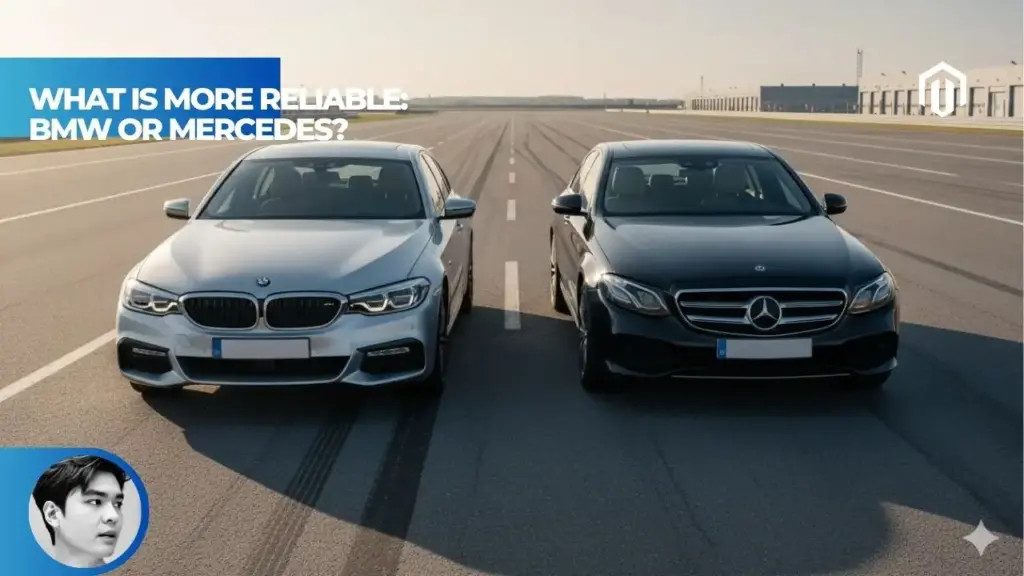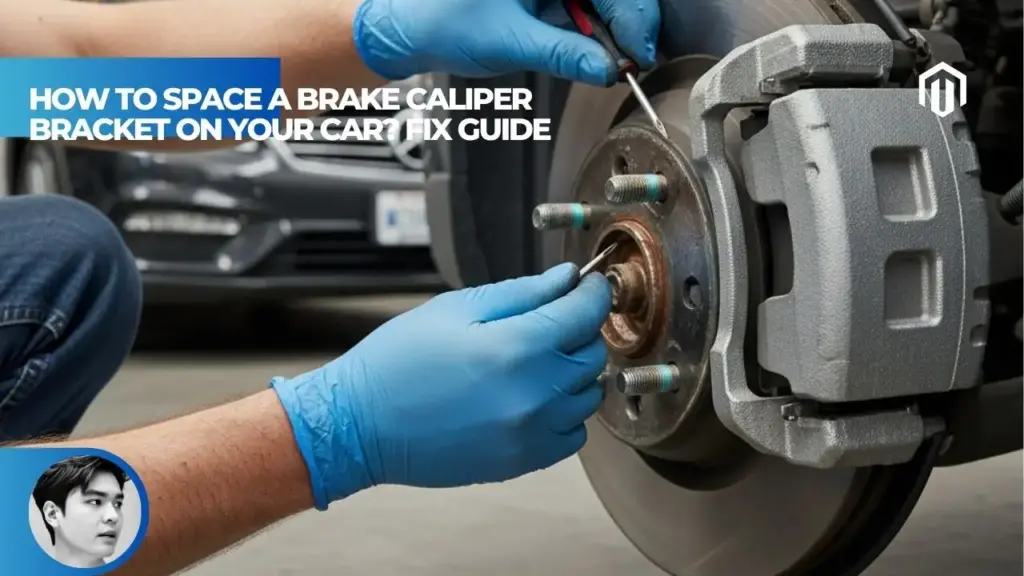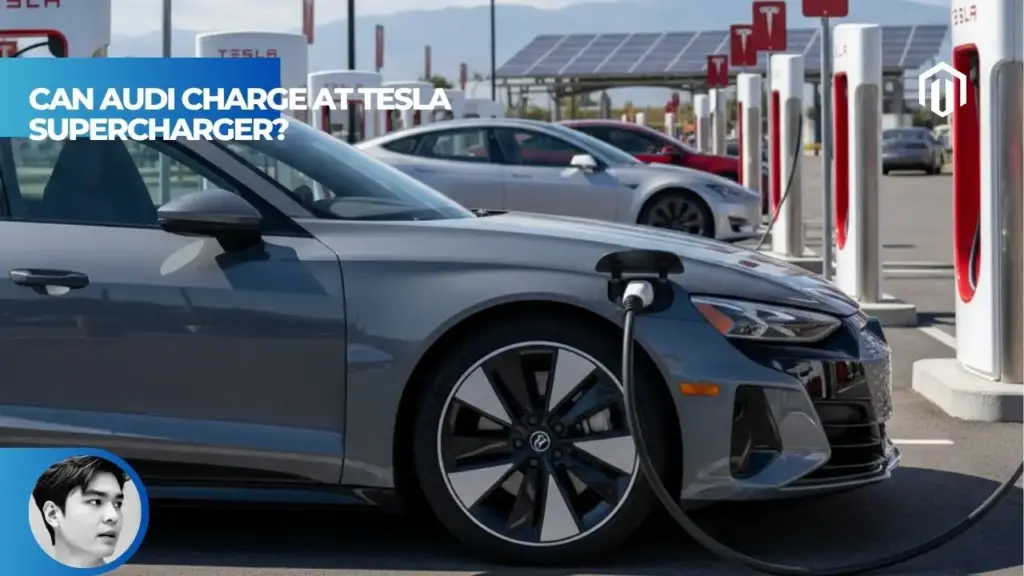You may also like:
- 【Explained】What Is More Expensive: BMW or Mercedes? (Cost of Ownership)
- 【Explained】What Did BMW Start Making Before Cars? (From Planes to Cars)
- 【Explained】What Mileage Do BMW Start to Break Down? High-Mileage Costs and Lifespan
- 【Explained】What Is the Difference Between a BMW X3 and X5? (A 2025 Buyer’s Guide)
- 【Explained】Can BMW Charge at Tesla Supercharger? The NACS Adoption Timeline Explained
BMW shows marginally better reliability than Mercedes-Benz according to recent J.D. Power studies, with BMW reporting 196 problems per 100 vehicles compared to Mercedes’ 243, though Mercedes maintains lower average annual repair costs at $908 versus BMW’s $968. Both German luxury brands fall below the industry average for reliability but offer comparable long-term ownership experiences when properly maintained.

BMW vs Mercedes Reliability Overview – Industry Ratings
Understanding reliability requires examining multiple industry sources, as each uses different methodologies to assess long-term dependability and owner satisfaction.
BMW vs Mercedes Reliability J.D. Power
The 2025 J.D. Power Vehicle Dependability Study reveals BMW performing notably better than Mercedes-Benz with 196 problems per 100 vehicles (PP100) versus Mercedes’ 243 PP100[1]. This represents a significant 47-point gap favoring BMW, though both brands score worse than the industry average of 192 PP100. The study, based on responses from 34,175 original owners of 2022 model year vehicles after three years of ownership, particularly noted BMW’s improvement in infotainment reliability.
J.D. Power’s findings show BMW maintaining this advantage consistently over recent years, with specific models like the 2017 BMW 2 Series achieving exceptional scores of just 88 PP100.
BMW vs Mercedes Reliability Consumer Reports
Consumer Reports’ 2025 rankings place BMW 8th overall for predicted reliability, significantly ahead of Mercedes-Benz at 11th position for used cars[1]. BMW’s stronger showing reflects better performance in key areas including engine major, transmission major, and in-car electronics. However, neither brand matches Japanese luxury competitors, with Lexus and Genesis dominating the top positions.
The data suggests BMW’s reliability advantage has widened since 2023, when both brands ranked closer together in overall brand report cards.
RepairPal Reliability Rating BMW vs Mercedes
RepairPal’s mechanical perspective paints a different picture, rating BMW at 2.5/5.0 stars (30th of 32 brands) while Mercedes-Benz scores slightly better[2]. This discrepancy from owner surveys reflects mechanics’ experiences with repair complexity and frequency. BMW averages 0.9 annual shop visits with a 15% probability of severe repairs, while Mercedes shows similar visit frequency but slightly lower severe repair probability.
According to Autvex service data, this difference stems from BMW’s more complex engineering requiring specialized diagnostics and tools.
BMW vs Mercedes Dependability Study
Long-term dependability studies consistently show both brands struggling with electrical and software issues. The 2025 studies highlighted problems with Android Auto/Apple CarPlay connectivity affecting both manufacturers equally. BMW’s over-the-air update success rate of 30% mirrors Mercedes’, suggesting neither brand has mastered remote problem resolution.
Three-year-old vehicles from both brands experienced increased issues due to COVID-era production challenges, with supply chain disruptions affecting component quality.
Brand Reliability Rankings 2024
Industry-wide rankings for 2024 positioned German luxury brands as follows:
- Porsche: Leading German reliability
- BMW: Second among Germans, 196 PP100
- Mercedes-Benz: Third position, 243 PP100
- Audi: Fourth place, 273 PP100
- Volkswagen: Last among premium Germans, 285 PP100
This hierarchy has remained relatively stable over the past three years.
BMW vs Mercedes Owner Satisfaction
Despite reliability challenges, owner satisfaction remains high for both brands. J.D. Power’s APEAL study shows BMW and Mercedes owners reporting similar emotional attachment scores, with BMW slightly ahead in driving dynamics satisfaction while Mercedes leads in perceived quality and comfort.
Loyalty rates exceed 60% for both brands, suggesting owners accept higher maintenance costs for the luxury experience.
Maintenance and Repair Cost Comparison
The financial reality of German luxury ownership extends far beyond initial purchase prices, with both brands demanding substantial maintenance investments.
BMW vs Mercedes Maintenance Cost
Annual maintenance costs reveal Mercedes-Benz as slightly more economical at $908 versus BMW’s $968[2]. This $60 difference compounds over ownership periods, potentially saving Mercedes owners $600 over ten years. However, individual model variations can exceed this brand average, with complex BMW M cars and Mercedes AMG models costing substantially more.
Both brands require premium parts and specialized labor, contributing to costs 40-50% above mainstream brands.
Average Annual Repair Cost BMW vs Mercedes
Breaking down the annual costs by service type:
| Service Category | BMW Average | Mercedes Average | Industry Average |
|---|---|---|---|
| Scheduled Maintenance | $450 | $420 | $280 |
| Unscheduled Repairs | $518 | $488 | $372 |
| Total Annual | $968 | $908 | $652 |
Are BMWs Expensive to Maintain
BMW maintenance ranks among the most expensive across all brands, sitting approximately 48% above industry average[2]. Contributing factors include:
- Complex twin-turbo engines requiring specialized service
- Sophisticated electronics demanding proprietary diagnostic tools
- Performance-oriented components wearing faster
- Limited aftermarket parts availability
The BMW Condition Based Service system, while extending intervals, results in more expensive individual services.
Are Mercedes Expensive to Maintain
Mercedes maintenance costs, while high, benefit from slightly longer service intervals and more widespread parts availability. The brand’s Service A ($250-350) and Service B ($450-600) structure provides predictable costs. However, Mercedes’ luxury features like air suspension and advanced driver assistance systems create unique expense categories.
According to Autvex analysis, Mercedes’ focus on comfort over performance typically results in less wear on mechanical components.
Out-of-Warranty Repair Costs BMW
Post-warranty BMW repairs escalate dramatically, with major repairs averaging $1,500-3,000 per incident. Common expensive failures include:
- Turbocharger replacement: $2,500-4,000
- High-pressure fuel pump: $1,800-2,500
- Electronic water pump: $800-1,200
- Valve cover gasket: $1,000-2,000
Extended warranties become attractive given these potential costs.
Mercedes-Benz Service A vs Service B Cost
Mercedes’ fixed service schedule provides transparency:
- Service A (10,000 miles): Oil change, filter replacement, fluid checks – $250-350
- Service B (20,000 miles): Includes Service A plus brake fluid, cabin filter – $450-600
Additional services like transmission fluid ($400), spark plugs ($500), or air filters ($200) rotate through subsequent intervals.
Which Is Cheaper to Maintain BMW or Mercedes
While Mercedes shows lower average annual costs, the total maintenance expense depends heavily on specific models. Comparing specific vehicles reveals:
- Entry-level: Mercedes A-Class cheaper than BMW 2 Series
- Mid-size sedans: Similar costs between C-Class and 3 Series
- SUVs: BMW X-series generally less expensive than Mercedes GL-series
- Performance: AMG models typically costlier than M equivalents
Common Problems and Failure Points
Understanding typical failure patterns helps predict future repair costs and reliability concerns.
Common BMW Problems
BMW’s most frequent issues include:
- Cooling system failures (40% of major repairs)
- Oil leaks from valve covers and oil pan gaskets
- Electronic malfunctions in iDrive and sensors
- Turbocharger wastegate problems
- Fuel system issues including HPFP and injectors
These problems typically manifest after 60,000 miles, with severity increasing in performance models.
Common Mercedes-Benz Problems
Mercedes-specific problems concentrate in different areas:
- Air suspension failures ($1,500-3,000 repairs)
- Electronic module malfunctions
- Transmission issues (particularly 7G-Tronic)
- Balance shaft problems in V6 engines
- Rust issues on pre-2015 models
Mercedes problems often emerge later but cost more to repair when they occur.
BMW Cooling System Failure
BMW’s Achilles heel remains the cooling system, with water pumps, thermostats, and expansion tanks failing predictably between 60,000-80,000 miles. The plastic components degrade from heat cycling, leading to catastrophic failures if ignored. Preventive replacement costs $1,200-1,800 but prevents engine damage potentially exceeding $10,000.
Electric water pumps in newer models show improved reliability but cost more when replacement is needed.
Mercedes Airmatic Suspension Problems
Mercedes’ Airmatic air suspension system, while providing exceptional ride quality, presents expensive failure risks after 80,000-100,000 miles. Compressor failure ($1,000-1,500), air strut replacement ($800-1,200 per corner), and valve block issues create substantial repair bills.
Many owners convert to conventional suspension ($2,000-3,000) rather than repeatedly repairing the air system.
BMW vs Mercedes Engine Reliability
Engine reliability comparisons favor BMW’s recent designs:
- BMW B58: Exceptional reliability with minimal issues
- BMW N55/N54: Problematic turbocharged predecessors
- Mercedes M276: Generally reliable V6
- Mercedes M278: V8 with timing chain concerns
Both brands’ diesel engines demonstrate superior longevity to gasoline variants.
BMW vs Mercedes Transmission Problems
Transmission reliability varies by type:
- BMW ZF 8-speed: Industry-leading reliability
- BMW DCT: Performance-oriented but maintenance-intensive
- Mercedes 9G-Tronic: Smooth but complex
- Mercedes 7G-Tronic: Known conductor plate issues
Manual transmissions, increasingly rare, show excellent reliability in both brands.
BMW B58 Engine Reliability
The B58 represents BMW’s most reliable modern engine, with minimal reported problems even at high mileage[3]. Common minor issues include:
- Coolant loss (often just monitoring needed)
- Valve cover gasket seepage after 80,000 miles
- PCV valve failures (relatively inexpensive)
- Oil filter housing gasket leaks
These issues pale compared to predecessor N54/N55 problems, making B58-equipped models excellent used car choices.

Model-Specific Reliability Comparisons
Individual model comparisons often contradict brand generalizations, with specific vehicles showing exceptional or poor reliability regardless of badge.
BMW 3 Series vs Mercedes C-Class Reliability
The perennial rivals show BMW 3 Series with superior reliability scores, achieving 85/100 versus C-Class’s 81/100 in recent studies[1]. The 3 Series benefits from proven powertrains and simpler electronics, while the C-Class suffers from overcomplicated infotainment and occasional transmission issues.
Maintenance costs remain comparable, though 3 Series parts typically cost 5-10% more.
BMW X3 vs Mercedes GLC Reliability
Compact luxury SUVs reveal interesting patterns, with the Mercedes GLC earning “most dependable” recognition in its class for 2022 models[1]. However, BMW X3 shows lower long-term repair costs and better engine reliability. The GLC’s air suspension option introduces expensive failure risks absent in the conventionally-suspended X3.
Both models demonstrate better reliability than their sedan counterparts.
BMW X5 vs Mercedes GLE Reliability
Mid-size SUV comparison slightly favors BMW X5 with more consistent reliability across model years. The GLE shows 80/100 quality scores but suffers from complex air suspension and electronic gremlins. BMW X5 configurations with simpler equipment typically prove most reliable.
Diesel variants of both show exceptional longevity exceeding 200,000 miles with proper maintenance.
Most Reliable BMW Model
Based on comprehensive data, the most reliable BMW models include:
- BMW X1: 86/100 reliability score
- BMW 2 Series: 85/100 score, minimal issues
- BMW X3: Consistent performer
- BMW 330e (hybrid): Surprisingly reliable
- BMW X5 diesel: Exceptional longevity
These models share simpler equipment and proven powertrains.
Most Reliable Mercedes-Benz Model
Mercedes reliability leaders include:
- Mercedes C-Class: 81/100 rating
- Mercedes GLC: Class-leading compact SUV
- Mercedes E-Class diesel: 200,000+ mile capability
- Mercedes GLA: Strong small SUV performer
- Mercedes C300: Balanced reliability/performance
Avoiding air suspension and complex packages improves reliability significantly.
Used BMW vs Used Mercedes Reliability
The used market reveals BMW offering better value due to steeper depreciation despite slightly better reliability. Three-year-old BMWs typically cost 5-8% less than equivalent Mercedes models while showing fewer problems. However, Mercedes’ simpler maintenance requirements may favor less technically-inclined owners.
Certified Pre-Owned programs from both brands offer similar coverage, though Mercedes includes an additional warranty year.
High-Mileage BMW vs Mercedes
High-mileage comparisons (100,000+ miles) show:
- BMW: Better rust resistance, more electrical issues
- Mercedes: Superior interior durability, suspension problems
- Both: Require preventive maintenance for reliability
- Diesel advantage: Both brands’ diesels excel at high mileage
Documentation quality matters more than brand at this mileage level.
Longevity and Lifespan Analysis
Long-term ownership potential varies significantly based on maintenance dedication and model selection.
How Long Do BMWs Last
Modern BMWs can achieve 200,000-250,000 miles with proper maintenance[4]. Key factors for longevity:
- Regular oil changes with proper specifications
- Cooling system preventive maintenance
- Addressing issues promptly
- Using quality parts for repairs
The record shows numerous BMWs exceeding 300,000 miles, particularly inline-six models.
How Long Do Mercedes-Benz Last
Mercedes-Benz vehicles typically last 150,000-200,000 miles or 10-12 years[4]. Longevity factors include:
- Robust diesel engines lasting longest
- Over-engineered older models (pre-2000) showing exceptional durability
- Proper maintenance extending lifespan significantly
- Climate affecting rust susceptibility
Mercedes holds several high-mileage records, particularly with diesel models.
BMW vs Mercedes Mileage
Mileage accumulation patterns show BMW owners driving slightly more annually (12,000 miles) versus Mercedes owners (11,000 miles). This difference reflects BMW’s sportier nature encouraging driving enthusiasm while Mercedes’ comfort focus suits luxury cruising.
Both brands handle high mileage better than most luxury competitors when maintained properly.
Which Car Lasts Longer BMW or Mercedes
Statistical analysis suggests BMW edges Mercedes in longevity, primarily due to better corrosion resistance and simpler suspension designs. However, individual model variations exceed brand differences. Autvex longevity data shows:
- BMW average lifespan: 15 years
- Mercedes average: 12 years
- Both surpass American luxury brands
Buying a BMW with 100k Miles
Purchasing a 100,000-mile BMW requires careful consideration:
Good candidates:
- B58-powered models (2016+)
- X3/X5 with service records
- Diesel variants
- Manual transmission models
Avoid:
- N63 V8 engines
- Complex M models without records
- Neglected cooling systems
Budget $2,000-3,000 annually for maintenance on high-mileage BMWs.
Buying a Mercedes with 100k Miles
High-mileage Mercedes purchases demand different priorities:
Recommended:
- E-Class diesels
- C-Class with conventional suspension
- GLC/GLK models
- 4-cylinder turbo engines
Avoid:
- Airmatic-equipped models
- V12 engines
- ABC suspension vehicles
- First-year redesigns
Expect $1,800-2,500 annual maintenance costs for 100,000+ mile Mercedes.
Long-Term Cost of Ownership Impact
Beyond routine maintenance, long-term ownership involves unexpected repairs and systemic issues affecting total costs.
Long-Term Cost of Ownership
Ten-year ownership costs reveal the true financial commitment:
| Cost Category | BMW 10-Year | Mercedes 10-Year | Difference |
|---|---|---|---|
| Maintenance | $9,680 | $9,080 | +$600 |
| Major Repairs | $8,500 | $7,200 | +$1,300 |
| Wear Items | $4,200 | $3,800 | +$400 |
| Total | $22,380 | $20,080 | +$2,300 |
These figures assume average mileage and exclude purchase price or depreciation.
BMW Oil Leaks
BMW’s propensity for oil leaks creates ongoing expenses. Common leak points include:
- Valve cover gasket: $1,000-2,000 repair
- Oil filter housing gasket: $600-900
- Oil pan gasket: $1,200-1,800
- Front/rear main seals: $1,500-2,500
Preventive gasket replacement during other services reduces long-term costs.
Mercedes-Benz Electronic Problems
Mercedes’ complex electronics create unique failure patterns:
- SAM modules: $500-1,000 replacement
- Command system failures: $1,000-2,000
- Sensor malfunctions: $200-500 each
- Wiring harness degradation: $1,500-3,000
These issues often cascade, with one failure triggering others.
NHTSA Recalls BMW vs Mercedes
Recall frequency analysis shows both brands with similar patterns:
- BMW: Averaging 3-4 recalls per model year
- Mercedes: Averaging 3-5 recalls per model year
- Common issues: Software updates, airbag components
- Response rates: Both achieve 75-80% completion
Neither brand shows concerning safety-related recall patterns.
Luxury Brand Reliability
Among luxury brands, German manufacturers face unique challenges:
- Lexus: Consistently most reliable
- Genesis: Emerging reliability leader
- Acura: Strong Japanese reliability
- BMW: Best among Germans
- Mercedes-Benz: Solid but costly
- Audi: Improving but still problematic
German brands prioritize performance and technology over simplicity, affecting reliability.

Key Takeaway
Recent studies show BMW slightly ahead in reliability with 196 problems per 100 vehicles versus Mercedes’ 210, though Mercedes has lower average annual repair costs at $908 versus BMW’s $968. Model-specific variations and maintenance history matter more than brand generalizations, with both requiring expensive maintenance compared to non-luxury brands.
Key Points:
- BMW shows better reliability in J.D. Power studies
- Mercedes offers lower average repair costs
- Both fall below industry average reliability
- B58 BMW engine exceptionally reliable
- Mercedes air suspension creates expensive risks
- Proper maintenance crucial for either brand
- Model selection matters more than brand choice
Next Steps
Research specific models using J.D. Power VDS and Consumer Reports data before purchasing. Get comprehensive pre-purchase inspections focusing on known problem areas like BMW cooling systems or Mercedes air suspension. Budget $1,000-1,500 annually for routine maintenance plus emergency fund for repairs.
Consider Certified Pre-Owned options for warranty coverage on either brand. Evaluate whether alternative luxury brands might better suit your reliability needs. Join model-specific forums to understand real-world ownership experiences and common issues.
For high-mileage purchases, verify complete service records and consider specialist pre-purchase inspections. Factor in specialized tool requirements if planning DIY maintenance. Research independent European specialists in your area for cost-effective service options outside dealership networks.
Frequently Asked Questions
What is more reliable, BMW or Mercedes?
Recent studies show BMW slightly more reliable with 196 problems per 100 vehicles versus Mercedes’ 243, though model-specific variations are significant.
Do BMWs or Mercedes have more problems?
Mercedes has slightly more problems overall according to J.D. Power, but BMW’s problems can be more severe and expensive when they occur.
Which brand is more expensive to maintain, BMW or Mercedes?
BMW is typically more expensive with $968 average annual repairs versus Mercedes’ $908, though both are costly compared to non-luxury brands.
What are the average annual repair costs for a BMW vs. a Mercedes?
BMW averages $968 annually while Mercedes averages $908, with costs increasing significantly after warranty expiration.
What is the most reliable BMW model?
The BMW X1, 2 Series, and X3 consistently score highest in reliability with ratings around 85-86/100.
What is the most reliable Mercedes-Benz model?
The Mercedes C-Class and GLC lead with reliability scores around 81/100, particularly in non-air suspension configurations.
How many miles can a BMW last?
BMWs can last 200,000-250,000 miles or 15 years with proper maintenance, though repair costs increase significantly after 100,000 miles.
How many miles can a Mercedes last?
Mercedes-Benz vehicles typically last 150,000-200,000 miles or 10-12 years, with longevity heavily dependent on maintenance history.
Is an old BMW or an old Mercedes more reliable?
Older Mercedes tend to be slightly more reliable, especially diesel models, though BMW has better rust prevention.
How do J.D. Power and Consumer Reports rate BMW vs. Mercedes reliability?
J.D. Power shows BMW at 196 problems per 100 vehicles versus Mercedes at 243; Consumer Reports ranks BMW 8th, Mercedes 11th.
Is a BMW 3 Series more reliable than a Mercedes C-Class?
The BMW 3 Series typically shows better reliability scores (85/100 vs 81/100), though the C-Class has lower repair costs when issues occur.
What are the most common problems with BMWs?
Cooling system failures, oil leaks, electronic malfunctions, turbocharger issues, and valve cover gasket failures.
What are the most common problems with Mercedes-Benz?
Air suspension failures, electronic problems, transmission issues on certain models, and rust on older vehicles.
Which brand is better to buy used, BMW or Mercedes?
BMW often offers better value used due to higher depreciation, but Mercedes may have lower long-term repair costs for average owners.
References
- J.D. Power. (2025). U.S. Vehicle Dependability Study (VDS). https://www.jdpower.com/business/press-releases/2025-us-vehicle-dependability-study-vds
- RepairPal. (2024). BMW Reliability Rating: Cost, Frequency & Severity Insights. https://repairpal.com/reliability/bmw
- BMW Tuning. (2024). The 5 Most Common BMW B58 Engine Problems. https://bmwtuning.co/the-5-most-common-bmw-b58-engine-problems/
- SlashGear. (2025). 3 Of The Most Reliable German Car Brands, According To Owners. https://www.slashgear.com/1965581/most-reliable-german-car-brands-according-to-owners/

I am a senior automotive analyst at Autvex. Expert vehicle evaluations, in-depth reviews, and objective analysis helping readers make informed automotive decisions with years of industry experience.








